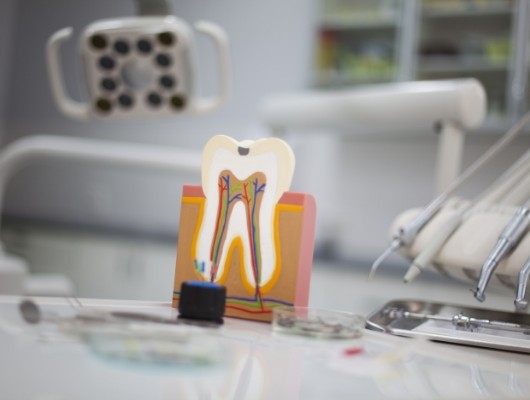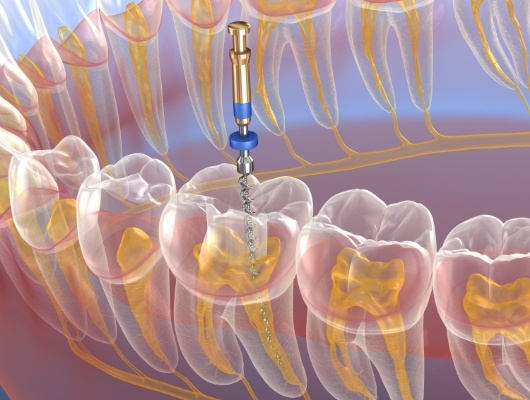Root Canal Treatment – Denton, TX
Restore Your Tooth’s Health

You’ve probably heard scary things about root canal treatment. Root canals have a bad reputation, but the truth is that the procedure itself is no more painful than getting a cavity filled. Perhaps the association results from the pain that often occurs before the root canal. Whatever the reason behind the myth, we at Prime Dentistry want you to know that you don’t have to be afraid of getting root canal treatment in Denton with us. Your oral health and your comfort are in good hands, so call us to schedule an appointment!
Why Choose Prime Dentistry for Root Canal Treatment?
- Sedation Dentistry Available
- CT/Cone Beam Scanner for Treatment Planning
- Gentle Dentist Who Brings 20+ Years of Experience
What Is a Root Canal?

Root canal treatment, often called a root canal, is essentially a dental procedure to remove decay from the center of an infected tooth. When decay has reached the dentin and pulp, the inner layers of the tooth, it can trigger and damage the nerves of your tooth, causing you pain or sensitivity. A root canal removes the pulp and damaged structure and restores your tooth to full health.
Why Do I Need a Root Canal?

Chances are you’ll know if you need a root canal. A common symptom is a severe toothache or sensitivity. In other instances, our experienced dentist finds the problem during your oral exam or in a digital X-ray, which helps us make proper diagnoses faster. In any case, you will likely need a root canal if the tooth decay has penetrated well beyond the enamel surface, but you can feel confident that our dedicated team can get rid of the issue efficiently and effectively.
What Happens During a Root Canal?

After numbing the area with a local anesthetic, your dentist will clean out the infected portions of the tooth structure. Then they remove the pulp and ensure that the center of the tooth is clear of bacteria. Then they can place a filling or temporary crown, depending on how much tooth structure was damaged. You may have to return another time to have your permanent crown placed.
Root Canal Recovery

Because the procedure involves the nerves of your tooth, you can experience mild to moderate pain and sensitivity afterward, but it shouldn’t last more than a few days. You can most likely manage this pain through over-the-counter medication. To prevent some of this pain, avoid chewing hard foods immediately after the procedure. If your pain continues after a few days, you should contact us.
At Prime Dentistry, we create a calm, comfortable environment, so you don’t have to be afraid of getting root canal treatment if you need it. We want to help you have a happy, healthy smile in the long term. Make an appointment with us today to see how we can help you do just that.
Root Canal FAQs
How Long Does It Take to Recover from a Root Canal?
While there’s no one-size-fits-all answer for how long your root canal recovery will last, many patients are able to return to normal activity the next day. While you can probably expect a quick recovery, there may be some soreness in your jaw for a few days after the procedure. This can usually be alleviated by over-the-counter pain medications, but if the pain continues or becomes unmanageable, it’s best to schedule a follow-up appointment with Dr. Ahir. To help prevent complications, make sure to eat soft foods, avoid chewing with the affected tooth, and be gentle with your oral hygiene around the site.
Why Do I Need a Root Canal if My Tooth Doesn’t Hurt?
Infections can be sneaky and insidious, going undetected for a long time by destroying the nerves that normally serve as an early warning system. This means that even though you don’t feel any pain, the sensitive tissues inside your tooth are slowly being eaten away. Coming in for routine checkups with Dr. Ahir is the best way to prevent the progression of oral infections that threaten your teeth. So, while it may not seem urgent, it’s best to have the procedure done as soon as possible after the damage has been found to prevent the infection from spreading to other teeth or into your jawbone.
How Long Does a Root Canal Take?
A single root canal treatment can usually be completed in one appointment, but more complex cases can take two. In a two-stage root canal, you’ll first be given antibiotics to help clear up the infection and reduce your pain. Then Dr. Ahir will perform the full procedure on your next visit. A typical treatment can take anywhere from 30 to 90 minutes depending on the position of your tooth and the number of roots it has. For example, molars, the teeth near the back of your mouth, are more difficult to reach and have up to four roots to fill at a time.
What Happens if You Wait Too Long for a Root Canal?
Your teeth are more sensitive than you might think. Unlike the rest of your body that can heal itself after sustaining an injury, they cannot. Once a tooth has an infection, it will only continue to get worse without intervention. Waiting too long to get a root canal will allow the infection to spread into neighboring teeth, your gums, jawbone, and even the rest of your body. Once an infection has made it that far, systemic illness will follow, making you incredibly sick and requiring immediate medical attention. So, before that happens, give our team a call to schedule an exam and treatment.





New Patient 1st Visit
Second Opinions

